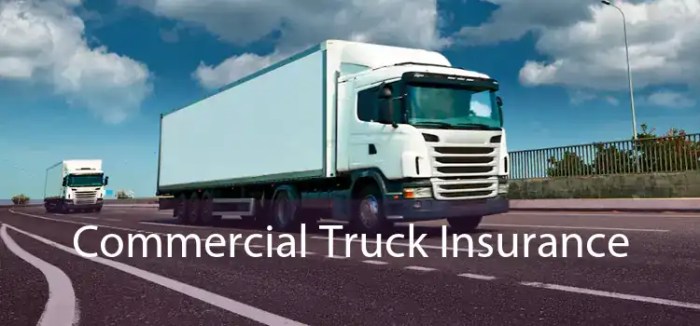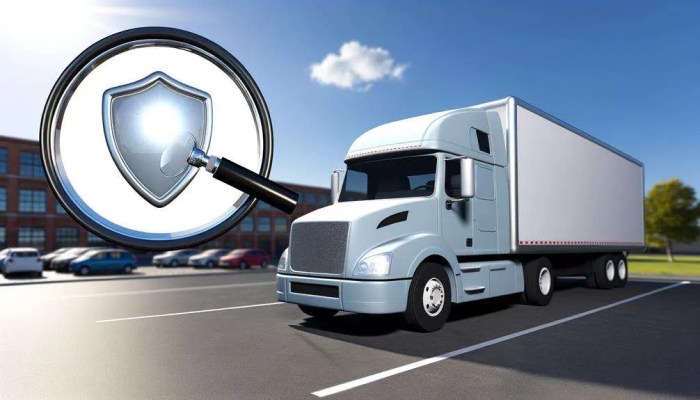Get commercial truck insurance is crucial for businesses relying on these vehicles. This guide delves into the complexities of securing the right coverage, exploring various policy types and factors impacting premiums.
Understanding the different types of insurance available for commercial trucks, from cargo protection to liability coverage, is essential. This comprehensive overview provides detailed information on each policy type, highlighting coverage details and potential exclusions. It also analyzes the key factors that influence insurance premiums, such as vehicle type, usage, driver history, and location. This detailed analysis aids in making informed decisions when choosing an insurance provider.
Types of Commercial Truck Insurance

Source: progressive.com
Commercial truck operations require comprehensive insurance coverage to protect the business and drivers from potential liabilities and financial losses. This insurance safeguards against a wide array of risks, ensuring smooth operations and financial stability. Understanding the different types of insurance available is crucial for making informed decisions and minimizing potential financial burdens.
Cargo Insurance
Cargo insurance policies protect the goods being transported by commercial trucks. This is vital for businesses that rely on the safe delivery of their products. The policy covers the cargo against various risks, including loss, damage, or theft during transit. Proper cargo insurance can help mitigate significant financial losses from unforeseen events.
| Policy Type | Coverage Details | Exclusions |
|---|---|---|
| Cargo Insurance | This type of insurance typically covers the value of the cargo during transit. It can protect against perils like fire, theft, vandalism, and accidents. Specific coverage amounts and types of perils insured can vary depending on the policy. Many policies also include coverage for delays in delivery, although this is contingent on the specific policy’s terms and conditions. | Often excludes damage caused by inherent defects in the cargo, acts of war, nuclear incidents, or damage due to improper handling by the shipper or receiver. Specific exclusions will vary depending on the policy’s terms and conditions. |
Liability Insurance
Liability insurance is essential for protecting a business from financial responsibility for accidents involving their trucks. This type of coverage safeguards against claims from injured parties or damaged property arising from the truck’s operation.
| Policy Type | Coverage Details | Exclusions |
|---|---|---|
| Liability Insurance | This type of insurance covers claims arising from accidents involving the truck, such as injuries to others or damage to their property. The policy will typically cover legal defense costs and settlements, ensuring the business is protected from significant financial repercussions. This often includes coverage for bodily injury and property damage. The limits of liability are specified in the policy, defining the maximum amount the insurer will pay. | Specific exclusions might include damage caused by intentional acts, pre-existing conditions of the insured, or certain types of hazardous materials transport. Consult the policy’s details for precise exclusions. |
Physical Damage Insurance
Physical damage insurance protects the truck itself from various risks. This type of coverage is crucial for maintaining the vehicle’s condition and preventing substantial repair costs.
| Policy Type | Coverage Details | Exclusions |
|---|---|---|
| Physical Damage Insurance | This policy covers damages to the truck from collisions, accidents, theft, fire, or other perils. The coverage can include repairs or replacement of the truck, depending on the policy’s provisions. It can also include coverage for vandalism or other types of damage. | Exclusions may include damage caused by wear and tear, faulty maintenance, or neglect. It’s important to review the specific policy for details on excluded damages. |
Factors Affecting Insurance Premiums: Get Commercial Truck Insurance

Source: getinsurance.ng
Securing commercial truck insurance involves understanding the various factors that influence premium costs. Insurance providers meticulously assess these factors to determine the appropriate coverage and associated expense. Understanding these factors empowers businesses to make informed decisions about their insurance needs and potentially reduce their premiums.Insurance companies use a complex risk assessment model to evaluate the likelihood of a claim and the potential financial impact.
This model considers a wide array of elements that contribute to the overall risk profile of a commercial trucking operation. The factors influencing premiums can be grouped into several key categories, each with its own set of sub-elements.
Vehicle Type
The type of vehicle significantly impacts insurance premiums. Larger trucks, heavier vehicles, and those designed for specific hazardous cargo often come with higher premiums. The specific make, model, and year of the truck also play a role. Modern trucks with advanced safety features might qualify for lower premiums. Specialized vehicles like dump trucks, tankers, or flatbeds will generally have unique insurance requirements and potentially higher premiums based on the cargo they carry.
Usage
The frequency and type of use of the truck affect insurance premiums. Trucks used for long-haul operations or those traveling through high-risk areas are often assigned higher premiums. The mileage driven, the route, and the frequency of trips also influence the assessment. Insurance companies might use data analytics and telematics to assess usage patterns, such as idling time, speed, and braking habits.
Frequent use in urban areas or those with high accident rates will also factor into premium calculation.
Driver History
Driver experience, training, and safety record are critical factors in premium determination. Insurance companies evaluate the driver’s history, including any previous accidents, violations, or claims. Drivers with a clean record and extensive training tend to qualify for lower premiums. A driver’s experience level, the amount of time they have been driving, and their training certifications all influence the insurer’s assessment.
Insurers may require specific endorsements or certifications for certain types of trucking jobs or routes.
Location, Get commercial truck insurance
The geographical location of the truck’s operations is another major factor. Areas with high accident rates, poor road conditions, or a higher incidence of theft have higher premiums. The routes the truck regularly travels, along with the frequency of those routes, influence the insurer’s assessment. For example, a truck that frequently travels through a region with high traffic density or a history of severe weather conditions may be assigned a higher premium.
Comparison Table
| Factor | Description | Impact on Premium |
|---|---|---|
| Vehicle Type | Size, weight, and type of cargo transported. | Larger and heavier vehicles, those carrying hazardous materials, will generally have higher premiums. |
| Usage | Frequency, mileage, and routes traveled. | High-mileage, long-haul, and routes through high-risk areas typically result in higher premiums. |
| Driver History | Experience, training, and safety record of the drivers. | Clean records and adequate training lead to lower premiums. |
| Location | Geographical area of operation, accident rates, and route characteristics. | Areas with high accident rates or hazardous road conditions have higher premiums. |
Finding the Right Insurance Provider

Source: businessinsurancechoice.com
Choosing the right commercial truck insurance provider is crucial for protecting your business and ensuring smooth operations. It’s a decision that goes beyond simply selecting the lowest premium; it involves careful consideration of reputation, services, and the specific needs of your trucking operation. A reliable provider will offer comprehensive coverage, excellent customer support, and a streamlined claims process, all of which contribute to your peace of mind.Selecting a provider involves a multifaceted approach, encompassing various factors like coverage options, customer service responsiveness, and claim settlement procedures.
This careful evaluation process is vital for safeguarding your business’s financial health and operational efficiency. This section will Artikel how to effectively compare providers and choose the most suitable one for your trucking company.
Comparing Insurance Providers
Different providers offer varying levels of services and customer support. Thorough comparison is essential to find the best fit for your needs. Analyzing provider reputations, services, and customer support helps in making an informed decision.
- Reputation: Assessing a provider’s reputation involves researching online reviews, industry ratings, and news reports. Positive feedback from previous clients can indicate a company’s commitment to customer satisfaction and efficient claims handling. A reputable provider often builds trust with a history of fair practices.
- Services: Consider the range of services offered by each provider. Beyond basic coverage, some providers may offer specialized services such as fleet management tools, driver training programs, or risk assessment resources. These additional services can significantly impact your operational efficiency and safety measures.
- Customer Support: A provider’s customer support responsiveness plays a significant role in claim processing and policy-related inquiries. Evaluate the speed, accessibility, and professionalism of their support channels (phone, email, online portal). Proactive communication and quick resolution to issues are key indicators of effective customer support.
Policy Details and Procedures
Understanding the specifics of each provider’s policies, procedures, and claims process is critical.
- Policy Provisions: Compare policy coverages for various risks, such as cargo damage, liability, and vehicle damage. Pay close attention to deductibles, policy limits, and exclusions. Understanding these details ensures that your coverage aligns with your business’s unique needs and financial capacity.
- Claims Process: Analyze the claims process for each provider. The process should be straightforward and efficient, minimizing delays in claim settlement. Compare the documentation requirements, communication channels, and average claim settlement times. This analysis will help you assess the provider’s efficiency in handling claims.
- Policy Adjustments: Explore how easily policies can be adjusted to reflect changing business needs. A flexible provider will offer options for increasing coverage or adjusting premiums as your business evolves.
Comparative Analysis Table
The table below provides a sample comparison of potential insurance providers, highlighting key aspects for consideration. This is a template; you should research specific providers and customize this table with relevant data.
| Provider | Reputation | Services | Customer Support |
|---|---|---|---|
| Provider A | High; numerous positive reviews and industry recognition. | Offers comprehensive coverage, fleet management tools, and driver safety programs. | Excellent; responsive to inquiries and efficient in claim processing. |
| Provider B | Good; mixed reviews, some concerns about claim handling. | Basic coverage, limited add-on services. | Average; adequate response time, but some customer service issues reported. |
| Provider C | Very Good; generally well-regarded, strong online presence. | Focuses on specific industry niches (e.g., hazardous materials transportation). | Excellent; known for specialized support for niche industries. |
Last Word

Source: myfullcoverage.com
Securing the appropriate commercial truck insurance is vital for businesses operating heavy vehicles. This guide has presented a detailed overview of various policy types, premium-affecting factors, and provider comparisons. By understanding the specifics of each aspect, businesses can confidently choose insurance that best aligns with their needs and minimizes potential risks. Ultimately, a well-informed decision will lead to cost-effectiveness and peace of mind.
Commonly Asked Questions
What are common exclusions in cargo insurance?
Common exclusions in cargo insurance often include damage caused by inherent defects in the goods, acts of war, or nuclear incidents. Specific exclusions vary by policy, so reviewing the fine print is crucial.
How does driver history affect insurance premiums?
A driver’s history, including past accidents, violations, and claims, significantly impacts premiums. A clean driving record generally leads to lower premiums, while a history of incidents can result in substantial increases.
What are the typical services offered by commercial truck insurance providers?
Typical services offered by providers include policy customization, 24/7 claims support, and online policy management tools. Additional services like roadside assistance or fleet management tools may also be available.
How can I compare different insurance providers effectively?
Compare providers by considering their reputation, policy features, customer support ratings, and claim settlement procedures. A combination of factors will help determine the most suitable provider.
